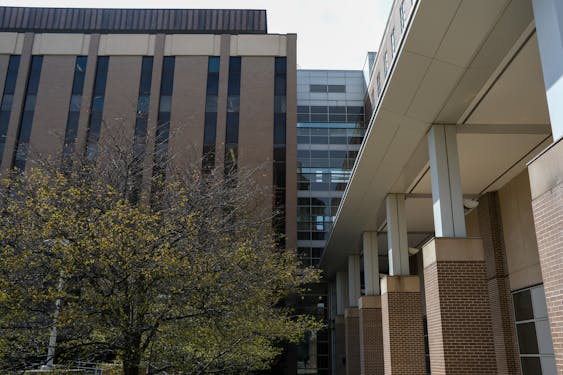Being surrounded by people in loud auditoriums makes attending lectures difficult for Amanda.
Amanda, a freshman at the University of Wisconsin-Madison whom The Daily Cardinal is identifying by a pseudonym due to privacy concerns, is sensitive to noise and touch, making lectures and exams difficult.
“Going to large lectures or having exams in large lecture halls is a nightmare for me,” Amanda said. “It’s a lot of closed spaces, small sounds and tight-knit quarters with people brushing me, being close to me, and it’s really distracting. It makes it hard for me to type and focus.”
There are 99 UW-Madison students on the autism spectrum, according to the McBurney Disability Resource Center’s 2022-23 annual report. But because the report counts only primary diagnoses — and because some students don’t utilize the McBurney Center — the actual number is likely much higher than that, according to McBurney Center Access Consultant Heather Stelljes.
“There are many people who identify as having a disability or being disabled that are not registered through our office because they don’t need accommodations,” Stelljes said. “My hunch would be the same for autistic students as well.”
Amanda is one such student who chose not to register with the McBurney Center.
“I’m also diagnosed with anxiety and depression, and I didn’t really want Madison to know about that,” Amanda said. “I’m also not sure if it would help my specific issues.”
Beyond difficulties with large lectures, Amanda said she struggles with small group discussions and group work, calling them “incredibly uncomfortable.”
“I don’t like to make eye contact,” she said. “I recognize I’m pretty awkward with new people, so I usually don’t participate.”
Amanda said she has anxiety about going to class, which impacts her understanding of course material, and she struggles to find places to study.
“I definitely struggle to study surrounded by people,” she said. “I’m so scared to make any noise, but then when people make noise it’s so stressful and I can’t focus at all. I usually go back to my dorm.”
But with construction ongoing at her dorm, Amanda said she feels like she can’t go back to her room either. And with the constant noise, it’s a long process for her to feel comfortable studying.
“It’s either going back to my dorm, a study room or gender neutral bathroom or just somewhere where I can be alone and quiet and know that no one's going to see me, like, ticing,” Amanda said.
Tics are actions common in autistic people resembling “patterned normal movements, but appearing repetitively, often with exaggerated intensity and increased frequency,” according to a study conducted at University Medical Center Hamburg-Eppendorf.
For Amanda, this can be anything from clicking in the back of her throat to raspy breathing or full body shivers. But to be comfortable, she said she needs a place to “unmask.”
“I have to look for one of the very few spaces where I can be alone somewhere where someone isn't waiting in line for me to be done,” she said.
What is autism?
Autism spectrum disorder affects an estimated 1 in 36 adults and 1 in 45 children, according to the CDC, and refers to a “broad range of conditions characterized by challenges with social skills, repetitive behaviors, speech and nonverbal communication.” April marks Autism Acceptance Month, which aims to raise public awareness of the condition and celebrate neurodiversity.
The condition may be directly related to the areas of the brainstem — a “stalk-like” structure located at the base of the brain — involved in autonomic functions, according to research from Brittany Travers, a Waisman Center investigator and professor of kinesiology.
“The brainstem is one of the earliest developing parts of the brain. So, it makes sense in a neurodevelopmental condition like autism that there would be differences that are happening in the brainstem that help explain the individual differences in autism,” Travers said in a press release.
Autism has increased over the last two decades, Director of the University Center for Excellence In Developmental Disabilities at the Waisman Center Leann DaWalt told the Cardinal. This is likely a combination of higher diagnosis percentages and more overall autistic people, she said.

As the name suggests, autism is a spectrum condition, with over 100 genes being suspected of playing a role in the condition, according to a press release from the Waisman Center.
“No autistic child is the same,” DaWalt said. “There are individual differences.”
As such, assigning global accommodations for autistic students is not enough. Stelljes said accommodations for autistic students would depend on “personal experience” and specific needs.
“There might be accommodations around extra time with testing, smaller group testing or testing alone,” Stelljes said. “There may be some accommodations around note-taking. It depends on how a student really thrives in different settings."
The Waisman Center’s research backs up this sentiment.
“Everybody is different. I think that's a truism that works across the life course,” DaWalt said. “Our research has shown that a lot of autistic adults as they move into adulthood, we see a lot of difference from childhood.”
Still work to do
For Amanda, the hustle and bustle of life as a student can be overwhelming.
She often skips meals at the dining hall with her friends because she “hates” eating in front of people and often gets meals to go. She said she’s noticed weight loss as a result.
“I'm definitely eating a lot less,” Amanda said. “Not because I'm not hungry, but just because I am scared and anxious.”
But Amanda said she wants her friends to understand she’s okay.
“I want them to understand how hard it is as an autistic person to do the things that they can do without a second thought. And to not assume I'm mad at them,” Amanda said. “But [to] just understand autism a little bit more, especially in a collegiate setting, and realize how hard it is for me to even go to the dining hall with them or go get on the bus to go see them.”
Amanda said she thinks there’s still a lot of work left to do to get autism awareness and accommodations to where they need to be.
Allowing students to sit in the quieter back row and making more classes partially online would be helpful, Amanda said.
She also asked her fellow students to be more aware of when they are touching someone or making noise.
“I think a lot of people don't understand what autism is,” she said. “I've heard people use autistic and the r-slur as an insult many times.”
She also hopes people stop using “autistic” as an insult.
“It’s awful, it's like someone using your name as an insult,” Amanda said. “If you have a friend or family member with autism, look up how you can help them and try to understand their symptoms instead of just writing it off as personality.”
Editor's note: This story was updated at 9:59 a.m. April 23, 2024.
Tomer Ronen is the Features Editor for the Daily Cardinal. He has covered protests, state politics, sports and more. Follow him on Twitter at @TRonen22.






